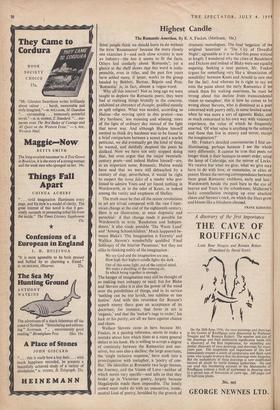Highest Candle
The Romantic Assertion. By R. A. Foakes. (Methuen, 16s.) SOME people think we should learn to do without the term 'Renaissance' because the more closely one examines it—and such close scrutiny is now an industry—the less it seems to fit the facts. Others feel similarly about 'Romantic'; yet a glance at the shelf shows that this word is indis- pensable, even in titles, and the past few years have added more, if lesser, works to the group headed by Babbitt, Barzun, Beguin and Praz. 'Romantic' is, in fact, almost a vogue-word.
Why all this interest? Not so long ago we were taught to deplore the Romantic poets; they were bad at realising things brutally in the concrete, exhibited an abeyance of thought, paddled messily in spilt religion. What was needed, according to Hulme—the moving spirit in this protest—was 'dry hardness,' less moaning and whining; more of the light of ordinary day instead of the light that never was. And although Hulme himself seemed to think dry hardness was to be found in• a brief comparison between a sunset and a scarlet petticoat, we did eventually get the kind of thing he wanted, and dutifully despised the poets he disliked. Now we have not only stopped doing that, but even argue that the major twentieth- century poets—and indeed Hulme himself—are, in an important sense, Romantic. Hulme would have said that we were still debauched by a century of slop; nevertheless, it would be right to suspect the bona fides of a reader who pro- fessed to admire Yeats and yet found nothing in Wordsworth, or in the odes of Keats, or indeed among the vanity and emptiness of Shelley.
The truth must be that all the minor revolutions in art are trivial compared with the vast Coper- nican change at the end of the eighteenth century. Here is an illustration, at once dogmatic and parochial : if that change made it possible for Wordsworth to write 'Resolution and Indepen- dence,' it also made possible The Waste Land' and 'Among Schoolchildren.' Much happened be- tween Blake's The Imagination is Eternity' and Wallace Stevens's wonderfully qualified 'Final Soliloquy of the Interior Paramour,' but they are alike in thinking nobly of the imagination : We say God and the imagination are one. . . . How high that highest candle lights the dark.
Out of this same light, out of the central mind, We make a dwelling of the evening air, In which being together is enough.
The hunger of imagination may still be thought of as making men unhappy or mad; but for Blake and Stevens alike it is also the power of the mind over the possibilities of things, and in its service 'nothing can be too lavish, too sublime or too festive.' And with this reverence for Reason's superb enemy there goes an acceptance of its doctrines; for instance, that form in art is 'organic,' and that the 'maker's rage to order,' his luck or his purity, are all we have against chance and chaos.
Wallace Stevens came in here because Mr. Foakes, in a passing reference, seems to make a mistake about him which hints at a more general defect in his book. He is willing to accept a degree of continuity between the Romantics and our- selves, but sees also a decline; the large assertions, the 'single inclusive response,' have sunk into a preoccupation with metaphor, a 'poetry of con- flict.' He identifies as Romantic two large themes, the Journey, and the Vision of Love—neither of which seems very specific—and tells us that they broke up in Victorian poetry, largely because Megalopolis made them impossible. The lonely crowd must make do with an unassertive, ironic, neutral kind of poetry, heralded by the growth of dramatic monologues. The final 'negation' of the original 'assertion' is 'The City of Dreadful Night'; agreeable as it is to find this poem noticed at length, I wondered why the cities of Baudelaire and Dickens and indeed of Blake were not equally negating. Seeking a neat pattern, Mr. Foakes argues for something very like a 'dissociation of sensibility' between Keats and Arnold (a new one for the list). And whereas he is right to say we miss the point about the early Romantics if we attack them for making assertions, he must be wrong about this decline from transcendental vision to metaphor; this is how he comes to be wrong about Stevens, who is dismissed as a poet concerned with poetry only, in some limited sense, when he was more a sort of agnostic Blake, and as much concerned in his own way with visionary experience, the value of which he frequently asserted. 'Of what value is anything to the solitary and those that live in misery and terror, except the imagination?'
Mr. Foakes's detailed commentaries I find un- illuminating, perhaps because I see the whole story differently. It cannot be true that poets no longer think it their business to assert order, using the lamp of Coleridge, not the mirror of Locke. We receive but what we give; what we give may have to do with love, or mountains, or cities or poems. Hence the moving correspondence between these great Romantic emblems, early and late; Wordsworth beside the pool bare to the eye of heaven and Yeats in the schoolroom; Mallarmd's lucky constellation swinging up over absolute chaos and Stevens's rock, on which the lilacs grow and bloom like a blindness cleaned.
FRANK KERMODE






















































 Previous page
Previous page